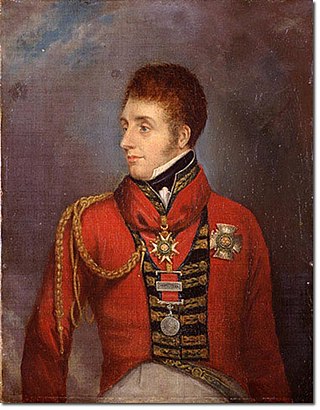
Major-General Sir William Ponsonby was an Anglo-Irish politician and British Army officer who served in the Peninsular War and was killed at the Battle of Waterloo.
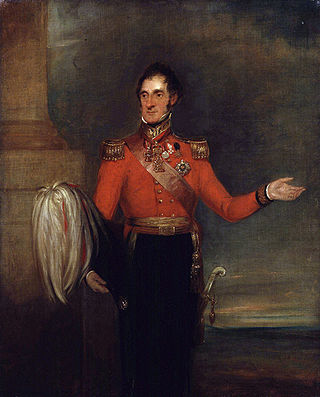
General Lord Robert Edward Henry Somerset was a British soldier who fought during the Peninsular War and the War of the Seventh Coalition.
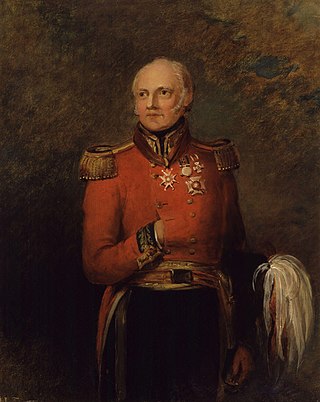
General Sir George Scovell, was a member of the quartermaster's staff of the British Army in Iberia during the Peninsular War.
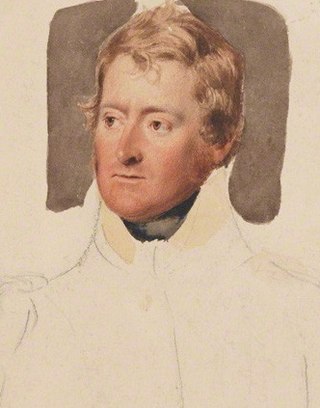
Major General Hon. Sir Frederick Cavendish Ponsonby was an Anglo-Irish military officer.

The 12th Royal Lancers was a cavalry regiment of the British Army first formed in 1715. It saw service for three centuries, including the First World War and the Second World War. The regiment survived the immediate post-war reduction in forces, but was slated for reduction in the 1957 Defence White Paper, and was amalgamated with the 9th Queen's Royal Lancers to form the 9th/12th Royal Lancers in 1960.
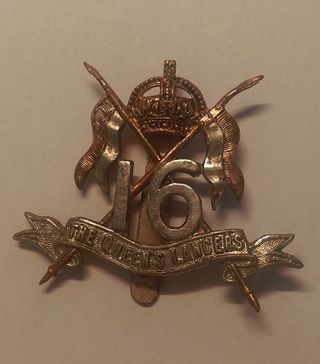
The 16th The Queen's Lancers was a cavalry regiment of the British Army, first raised in 1759. It saw service for two centuries, before being amalgamated with the 5th Royal Irish Lancers to form the 16th/5th Lancers in 1922.

There have been three baronetcies created for persons with the surname Carew, two in the Baronetage of England prior to 1707, one in the Baronetage of Great Britain.

Major-General James Grant was born in Middlesex about 1778, the son of James Grant of Dalvey, of the line of the Baronets Grant of Dalvey, Elgin, themselves an offshoot of Grant of Grant. His father was an official of the East India Company and served in India for many years before retiring to Vache Park, Buckinghamshire and later to Goldington Grange, Hertfordshire. His actual mother is not yet known, although his step-mother was Harriet Montagu, daughter of the 5th Earl of Sandwich.

Colonel Henry Verney, 18th Baron Willoughby de Broke and de jure 26th Baron Latimer of Compton Verney in Warwickshire, was a British peer.

Robert John Verney, 17th Baron Willoughby de Broke and de jure25th Baron Latimer of Compton Verney in Warwickshire, was a peer in the peerage of England.
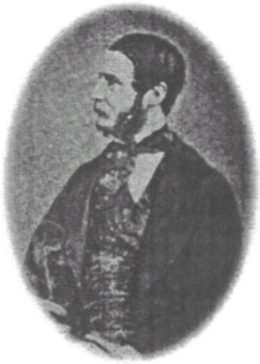
Lieutenant-Colonel William Morris was a British Army officer who rode in the Charge of the Light Brigade.

Sir Hugh I Courtenay, of Haccombe in Devon, was Sheriff of Devon for 1418/19 and was thrice elected knight of the shire for Devon in 1395, 1397 and 1421. He was a grandson of Hugh de Courtenay, 2nd/10th Earl of Devon (1303–1377), was the younger brother of Edward de Courtenay, 3rd/11th Earl of Devon (1357–1419), "The Blind Earl", and was the grandfather of Edward Courtenay, 1st Earl of Devon (d.1509), KG, created Earl of Devon in 1485 by King Henry VII. He was the link between the senior line of the Courtenay Earls of Devon made extinct following the Battle of Tewkesbury in 1471 and the post-Wars of the Roses creation of a new Earldom for his grandson made in 1485 by King Henry VII.
The 23rd Light Dragoons was a cavalry regiment of the British Army which existed several times.

Sir Henry Carew, 7th Baronet (1779–1830) of Haccombe in Devon, was a member of the landed gentry of Devon.

Lieutenant-General Sir Joseph Thackwell was a British Army officer. He served with the 15th Hussars in the Peninsular War at the Battle of Sahagún in 1808 and the Battle of Vitoria in 1813, and he lost his left arm at the Battle of Waterloo in 1815. He commanded the regiment from 1820 to 1832. He then served in India, commanding the cavalry in the First Anglo-Afghan War of 1838–89, and at the Battle of Sobraon in the First Anglo-Sikh War of 1845–46, and at the Battle of Chillianwala and Battle of Gujrat in the Second Anglo-Sikh War of 1848–9. He also commanded the 3rd The King's Own Dragoons, was colonel of the 16th Lancers, and was appointed Inspector-general of cavalry.

Mohuns Ottery or Mohun's Ottery, is a house and historic manor in the parish of Luppitt, 1 mile south-east of the village of Luppitt and 4 miles north-east of Honiton in east Devon, England. From the 14th to the 16th centuries it was a seat of the Carew family. Several manorial court rolls survive at the Somerset Heritage Centre, Taunton, Somerset.

West Ogwell is a village and former civil parish and manor, now in the parish of Ogwell, in the Teignbridge district, in the county of Devon, England. It is located 2 miles south-west of the town of Newton Abbot and 1 mile west of the village of East Ogwell. The church and manor house "lie hidden away on their own". In 1891 the parish had a population of 39. In 1894 the parish was abolished and merged with East Ogwell to form "Ogwell".

Denbury is an historic manor in Devonshire, England. The manor house, known as Denbury Manor is situated on the edge of the village of Denbury.
Hugh Napier Douglas-Pennant, 4th Baron Penrhyn was a British nobleman and army officer.

The manor of Haccombe was a historic manor in the small parish of Haccombe, near the town of Newton Abbot, Devon, England. It was the seat of important branches of the Courtenay and Carew families.

















